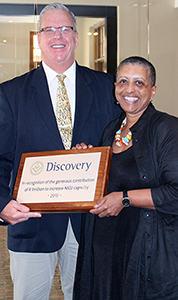Latest News Archive
Please select Category, Year, and then Month to display items
09 March 2022
|
Story Dr Cornelius Hagenmeier
 Internationalisation professionals attending the Dialogue on Innovative Higher Education Strategies National Multiplication Training workshop at the UFS.
Internationalisation professionals attending the Dialogue on Innovative Higher Education Strategies National Multiplication Training workshop at the UFS.
Dr Segun Obadire (Univen) and
Dr Cornelius Hagenmeier (UFS), who serve as directors responsible for the international offices at their universities, are part of the training committee. The theme of the training programme is ‘Enabling Internationalisation in Light of the 2020 Policy Framework for Internationalisation of Higher Education in South Africa 2022’; it comprises two training workshops and several virtual engagements. The first training workshop was held at the UFS from 1 to 3 March 2022.
Trendsetters
Mrs Nontlanhla Ntakana and Mr Matome Mokoena are alumni of the biannual DAAD DIES Training Course on Management of Internationalisation (MOI) at the
Leibniz University Hannover in Germany. They seized the opportunity to forge a multiplication training that would impact internationalisation leaders and managers from across South Africa and empower them to leverage the 2020 Policy Framework for Internationalisation of Higher Education in South Africa to advance the internationalisation process at their institutions.
Internationalisation experts
Dr Nico Jooste and Mrs Merle Hodges served as external experts on the training committee. Both are internationally renowned experts in the field and former presidents of the
International Education Association of South Africa (IEASA). Mr Leolyn Jackson (Central University of Technology, CUT) and Prof Lynette Jacobs (UFS) also contributed to the first training workshop.
Structure
This programme commenced in February, with participants engaging in topical readings and submitting their first assignment. First, a virtual workshop introduced participants to the UNIVEN Moodle e-learning platform used for the course. The face-to-face workshop at the UFS will be followed by a second in-person training at the University of Venda in September 2022. Virtual workshops and support of the participants through a dedicated WhatsApp group and other mentorship programmes will ensure the continuity of the training between the face-to-face workshops. Participants who were unable to attend the UFS and UNIVEN workshops in person could participate via a virtual link, thus ensuring that no participant is left behind.
Participants
Twenty participants from eight public higher education institutions were selected by the training committee to participate in the training programme. Two participants from this year’s NMT cohort were also accepted into the DIES MOI course at the Leibniz University Hannover in Germany. They are
Prof Nontokozo Mashiya from the University of Zululand (Unizulu) and Mbali Mkhize from the
Mangosuthu University of Technology (MUT). Participants in the first workshop have indicated that they gained a lot from the numerous exercises and activities in the programme. They also mentioned that the programme would change the outlook of internationalisation at their universities in the future.
Neonatal Care Unit receives donation to expand capacity
2015-10-28
 With the best care and technology available,
the survival rate of premature
babies is about 85%. The neonatal intensive
care unit at the Universitas hospital can now
expand its capacity thanks to a donation of
R1 million by the Discovery fund.
From the left is Prof André Venter.
Head: Department of Paediatrics and
Child Health at the UFS, and mrs Ruth Lewin,
Head: Corporate Sustainability at Discovery.
|
The smallest people need the greatest care. This care is being provided by the neonatal unit in the Children’s Wing of the Universitas Hospital. This project of the University of the Free State (UFS), under the leadership of Prof Andre Venter, has led to several miracles regarding child health since its inception.
Now, thanks to a donation of R1 million rand from the Discovery fund, this unit can expand its capacity and treat more premature babies.
About 14% of babies in South Africa are born before the 37th week of pregnancy. These babies are born with a very low birth weight, and are in need of critical care. The neonatal intensive-care unit at Universitas Hospital is currently equipped to take care of about 14 premature babies at a time, from birth to discharge. However, because of the high incidence of premature births in the hospital’s service area, the unit needs about 45 beds.
The aim of the Children’s Wing Project is to expand the neonatal intensive-care unit in order to meet the demands of the hospital’s service area, which reaches as far as the Southern Cape. The Discovery Fund recently donated R1 million to the project, which will be used to expand the capacity of the neonatal intensive-care unit.
“With the best care and technology available, the survival rate of premature babies is about 85%. Without this, half of all premature babies would die,” says Prof Venter, Head: Department of Paediatrics and Child Health at the UFS.
“This is the reason why private and public partnerships, such as the one with Discovery, are essential to make specialised services available to the most vulnerable people. Discovery has made a significant contribution to the project without which we would not have been able to expand the capacity of the unit